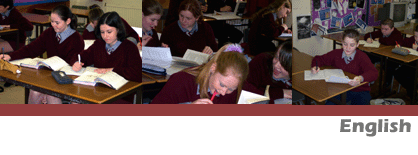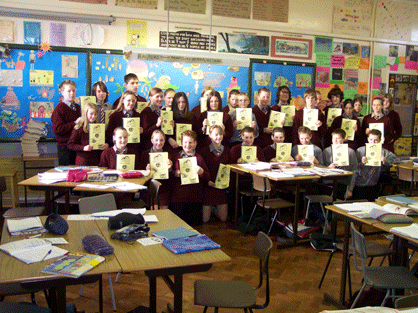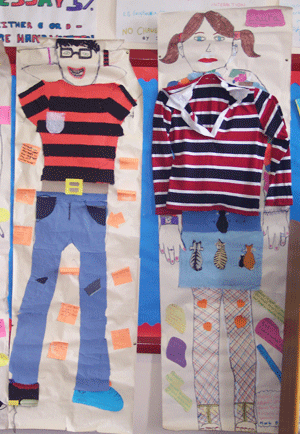

Home | About Us | History | Prospectus | Departments | Events and Societies |
||
Location | Useful Links | Search | Contact Us |
English
Maths
Science
History
R.E
Geography
ICT
Languages
Home Economics
Child Development
Technology
Business Studies
Art and Design
Music
Physical Education
Careers
LSC
Road Traffic Studies
PSHE
Library

Exemplar Work
This section showcases some of the best work received by the Department over the past year. Each English teacher has chosen a piece of writing by which he or she was particularly impressed.
This essay by Ross Hill in 11.Voc (3) is one of his four GCSE Language coursework essays; this one is Assignment D, which asks for a piece of personal / creative / imaginative writing.
“AN OUTING I’LL NEVER FORGET”
Finally the bell rang and everyone rushed out to get the bus. I walked towards the minibus and saw my classmates. I went to reach out for the door with my trembling hand but then someone pushed in front of me. As soon as they opened it, a crunching sound was made by the minibus door. We all excitedly stepped on to the minibus to see who could get the best seats at the back. All of us were seated quickly. Miss Roddy switched on the ignition and we were on our way to Dundonald Ice bowl.
Driving through Newcastle and then stopping in Dundrum to pick up Mrs Hackney, the music was low at the back but high at the front and our teachers were quite deafened!
Eventually we arrived at Dundonald at about 5.30pm. The minibus stopped in the car park and we poured out to stretch our legs. It felt like they needed to be oiled! Slowly we walked towards the building and nervously stepped through the door. A very funny smell came swooshing at me. It was indescribable. We paid for our bowling and then we were ready to rock ‘n’ roll! Most of the class were on the fruit machines and I played air hockey.
After we did that we had to wait for some people who were having lessons to come off the ice, so we had something to eat. We went to the café which is actually part of the complex. It didn’t have a great range of food and actually was rather dirty and rundown. I did not get anything to eat there as it cost too much and as I said it wasn’t very nice. Shortly after that we played pool and, of course, I won! The pool tables were up in the area where you could play “glo-bowls”. This is just like ordinary bowling but the bowls glow in the dark. This wasn’t available during our night out which was a pity and I think it would be cool to see the pins being knocked down by the mysterious, shiny bowling ball. Actually, one of the pool tables was broken so I played one game of singles with Andy and then we had a doubles match with the teachers. It was good fun and passed the time until the ice was free.
Finally the time had come and we paid to go ice skating. We had to line up to get the skates and once these were laced tightly on our feet we flew out on to the ice. We went round and round all night. After a short while everyone’s feet started to hurt. I nearly fell over once but luckily I didn’t. It was fantastic feeling the breeze in my face and hearing the swish of the skates. I loved it.
Overall I thought the whole night was brilliant. I think the best bit was when we were flying round the ice like lunatics and when my friend fell into the barrier. Also, at the ten pin bowling, our teacher won all the time but she must have been cheating because she was very good!
My friends said that the meal they got there tasted like sour milk but I suppose you can’t have everything. I would have to say that the best food I had all night was when we went to Macdonalds on the way home.
Last but not least, I would certainly recommend this evening to anyone who likes a good, relaxing night out because the atmosphere was great and there were a lot of nice people at the Ice bowl. It was a very enjoyable experience and it wasn’t expensive. So, save up your money and book yourself into a good night out at Dundonald!
Ross Hill, 11.Voc (3)
This essay by Judith Holmes in 9.1 is one of her KS3 writing assessments. In Term 2 of Year 9 pupils complete a unit on structuring their creative writing; they aim to follow the SECR pattern : setting, event, complication and resolution. (Due to constraints of space, this essay has had to be edited).
“A NEW TOMORROW”
The “Irish Mist” left the docks of County Galway with a sad farewell from onlookers. Aoife O’Reilly took a long last look at her homeland. The stunning views, fields of green and happy locals were the only memories she wanted to remember of the “Emerald Isle”. The fields were no longer green but a horrible black and brown and smelt of rotting crops and disease. The locals seemed to perish before her very eyes and famine had taken over the stunning view, leaving it to fade away in the distance.
When the last cliff of Ireland had disappeared from sight, Aoife realised that there was no turning back. They had set sail for the land with no poverty and bountiful food. The land of new hope and opportunities. America was going to be her new home.
With tears in her eyes, she turned round to tend to her sick brother Connor who was only eight years old. Their dying mother had made nineteen year old Aoife take Connor to America to start a new life. However, they both knew that all their mother really wanted was for Aoife to find a wealthy, respectable husband to settle down with. Aoife thought this to be impossible, until she met Dr. David Carlton.
Aoife and Connor waited on their cramped bunks below deck for the ship’s doctor. When he entered the cabin, Aoife’s knees went weak and for a minute she forgot all about famine, poverty and the dying stench that lingered in the air on the boat. He was her sunshine on a rainy day. Her spark of new hope. His bottle-green eyes met hers. She was in love.
Dr. Carlton examined Connor and Aoife knew by the look on his face that the diagnosis wasn’t going to be good. Connor had famine fever, a very contagious disease. His symptoms were an extremely high temperature, an irritable rash and weakness. The doctor gave him a balm for the rash and a foul concoction to treat the fever. The smell of the medicine reminded Aoife of the horrible odour of the rotting potato fields back home.
-------------------------------------------
The short service at Connor’s burial seemed unbearable to Aoife. To be buried at sea was a sailor’s grave, not for an eight year old boy. It began to become too overwhelming for Aoife; sadness was all she seemed to know. Looking out at the vast ocean before her she felt a gentle tap on her shoulder. Dr. Carlton stood by her side, saying that grieving was easier when shared between two.
-------------------------------------------
Two years had passed and Aoife was no longer an impoverished “Irish tramp”. She had become successful in her dressmaking and had started up a shop of her own. Meanwhile, Dr. David Carlton had returned to Boston in search of his lost love. While on his search he stopped in a dressmaker’s shop to get out of the chilly winter air. Behind the counter stood a well-dressed, beautiful lady whose watchful stare followed him round the shop. This lady was Aoife. She knew it was David; she recognised his shuffling walk, his broad shoulders and the tuft of hair on his head which always stood on end. Aoife was no longer out of his league; she had gradually climbed the social ladder and had made a living for herself. David caught a glimpse of a ring on the lady’s finger. His heart skipped a beat; that was the same ring he had given to Aoife all those years ago.
Their eyes met, their old flame had been rekindled and a pair of soulmates had been reunited. Aoife’s mother’s will was fulfilled; Aoife was to be an American bride.
By Judith Holmes. 9.1
The next piece is by Gary Orr of 10.3, who has written about a real-life episode which happened the first time he was allowed to go out on his dad’s fishing boat overnight with the rest of the crew. WARNING – do not read this if you are eating!
“THERE’S A FIRST TIME FOR EVERYTHING!”
I was awakened one school morning by a shake. I thought it was my mum, but to my surprise it was my dad, who incidentally had been fishing all week. My sisters, who were still sleeping, had no idea what was going on, and frankly neither did I.
The next thing I knew, my mum was packing my bag to go fishing. I was so excited and enthusiastic. I had never been out fishing on the boat with my dad before. Not that I hadn’t begged him often enough to take me with him. Looking back, the reason why he hadn’t taken me may have had something to do with the fact that I was then only six years of age.
I remember giving my mum a hug before I left home. She kept making my dad say he wouldn’t take his eyes off me. I don’t think she wanted me to go, but nothing was going to stop me now! I was in such a jumpy and jittery mood while I was getting on to the minibus. I felt so important, as if I was part of the crew and the boat couldn’t go to sea without me. Finally, my journey began.
We left Kilkeel in the minibus around 7.00am and picked up the engineer on the way.
When I actually set foot on the boat, I was like a puppy that had been let off its lead. I dashed up forward into the bow, then down and up the steps into the wheelhouse. Next I was down the stairs into the galley, and then into my dad’s bedroom. I finally stopped when my dad said there was work to be done.
The work took all day.I wore my boots and my boiler suit ; I was happy because I looked just like my dad. I wore a pair of his gloves for a while, but I gave up trying to keep them on when they had fallen off for about the twentieth time. The engineers worked in the engine room; there was a lot of preparation.
When the work was completed and it was time for tea, I wasn’t hungry which was probably due to the fact that I had eaten so many biscuits and crisps, not to mention the bag of sweets which my mum had put into my bag. It was a Chinese meal; despite not being hungry I was able to eat my share, plus some ice cream afterwards. I found out later this was rather too much…….
We left the harbour at ten and everything was going well….that is until I went to bed. My stomach began to feel sore. Then the soreness turned to pains. I got up and went outside for some fresh air. I had just taken a glass of freezing cold water, when it happened…
My stomach gave in to the temptation to rid itself of everything that it had on board. I was leaning over the side at the time and I could feel my legs going cold. Next thing – puke. The curry, the chips and the rice were flying out of me. I saw a lot of crunched-up crisps and a lot of ice-cream. Practically everything I had eaten was on its way out. In a short time it was all over, and my dad took me back inside.
When the rest of the crew heard about tit I was so embarrassed. Paul the cook still teases me to this day. (But he gave himself food poisoning, so I use that to tease him.)
The good news was that that night we had a good catch of fish and when I woke up the following day, much to my relief, we were in port landing the fish. I was overjoyed at first but then I thought to myself, this must be because of me; why else would we be going home? The feeling of embarrassment quickly returned; I felt that everyone was feeling sorry for me and I did not like that. My dad assured me that it was not because of me but I thought he was just being kind.
It was another four years before the opportunity arose for me to go back to sea. By this stage I had grown up and matured a lot. I knew not to run about all over the place and certainly not to eat so much junk food before going to sea – but hey! There’s a first time for everything!
By Gary Orr, 10.3
The photograph shows Gary with the rest of his class, displaying their short story booklets which they presented to family and friends.

The next piece was written by Ruth Shannon, 11.Ac (1), as part of her GCSE Language coursework. (Due to constraints of space, this essay has had to be edited).
“THE KATALUMIN LADY”
A still, chilly silence pervaded the atmosphere as a ship left London dock under cover of thick darkness. The hustle and bustle of a relatively busy afternoon had ended and the passengers of the “Katalumin Lady” had retired to their cabins.
It was rather a poor boat, quite obviously a decommissioned fishing vessel which had been patched up with new boards and decorated with cheap finery, ultimately changing it into a cruise ship. Increasing speed and larger ripples seemed to reflect the feelings of those on board, glad to escape the smog of inner-city life.
Meanwhile, alone on the topmost deck, the tall, slim figure of a young girl stirred the silence. She paced to and fro, hypnotised by the motion of the ship, the burden of thought weighing her down, until at last she collapsed, weary with worry, against the rail of the ship and shuddered.
Raphaella hated life on ship; she longed for a home, a good father and mother. A mother. This was her dream, her only ambition. She must find her mother- if not for herself , then for Harry. He was only four – and without a mother.
Diana Hoddenwarf had disappeared when Raphaella was eleven. Nothing had been said or done – except that the captain had been in an unusually hot temper and had thrown himself into a rage when asked by his daughter where his wife had gone. He didn’t seem at all inclined to look for her and Raphaella had not seen or heard from her mother since.
-------------------------------------------
Harry had not yet been afflicted with the burden of his father’s taskmastery. He skipped among the passengers like an eager grasshopper, smiling and laughing at all that he saw. Much of his time was devoted to following his beloved “R’ella”, chattering in his inquisitive manner and demanding an answer to the most unusual and unexpected questions. Meanwhile, the Captain stood at the wheel, using it as his support while he filled his mouth with the deadly liquor upon which he had come to depend.
-------------------------------------------
Raphaella lit the stub of a candle and reached for a well-worn book – her diary.
5th August, 1934.
“Another day of anxiety. I hate life. Why, oh why, did Harry ask me that? If he has a mama. Of course he has one. I mean – don’t we all? I wish he knew everything. Diana Hoddenwarf. Missing. Diana Hoddenwarf. Found. We will find her - no we won’t – I could ask…..my father? I could…read his journal!”
-------------------------------------------..
Raphaella found the book she had been looking for. Worn, old and rather battered, she recognised the journal by its sea-green cover. It was not an exceptionally interesting book: accounts of sailing conditions, profits and the doings of crew and passengers predominated. Family matters were merely referred to.
The journal fell open at the back cover. An envelope had been put in there; it contained a letter from her mother to the Captain, written before Raphaella’s birth. Raphaella glanced at the address. An idea began to form in her mind. She wrote to the address where her mother must have stayed once, telling who and where she was and asking for information about Diana. She asked for any reply to be directed to the post office in Nice, where they would dock next.
No letter had come to Nice post office when Raphaella checked. She gave up hope of ever finding her mother and spent the next few days labouring on the ship with a fresh vengeance. During their stop in Nice, Harry developed the annoying habit of asking everyone he met, passengers and crew alike, where his mother was. It was on the last day of August that he approached a beautifully dressed lady, who burst into tears and dragged him off to her cabin. Passengers who witnessed this scene whispered amongst themselves. The lady told Harry to find his sister, which he gladly did. When Raphaella arrived, Diana Hoddenwarf introduced herself. Raphaella searched her mother’s face, nodded, and hugged her.
-------------------------------------------
Raphaella sat at the end of the couch, speechless and motionless with an overwhelming joy, her eyes shining and her face glowing. Harry had understood very little of what the lady had said and had sat quietly, his hands in his lap, staring inquisitively at this very talkative lady. He turned to his sister. “R’ella,” he asked, “Is she my mama?” Raphaella nodded with a slow smile. He turned back to his mama.
“I like you,” he said.
By Ruth Shannon, 11.Ac (1)
The next piece was written by a former “A” level student as part of her “A2” Literature coursework on the twentieth century novel. In these essays, students and teacher work together to draw up an individual essay title. At “A” level, coursework must analyse contextual and critical influences, as well as textual analysis. (Due to constraints of space, this essay has had to be edited).
Coursework title:
“Forster often criticised in his novels Victorian middle class attitudes and British colonialism through his strong women characters.” E.M.Forster ed. by Harold Bloom (1987)
Discuss, with reference to A Passage To India how, if at all, Forster uses strong women to criticise “Victorian middle class” attitudes and, if he does use women, discuss what attitudes he criticises through them.
In your answer you should consider;
-
Forster’s life, in particular his own opinions and criticisms, his childhood and his religious beliefs;
-
The different social groups of female characters in the novel: Indian women, British women in India, British women in England, Adela and Mrs Moore;
-
Typical middle class Victorian attitudes towards: India and Britain’s role in India, British morals;
-
The views of other critics.
(From the student’s introduction)
I believe that A Passage To India is a critical, perhaps even philosophical, novel in which Forster criticises the attitudes and exposes the truth of the British colonies in India and I believe that women are a vital component in displaying the true faults of middle class attitudes.
At this point in the introduction I would like to illustrate that, although Forster was writing in an Edwardian era, his characters are almost completely uninfluenced by this factor. As Forster’s characters have been raised in the Victorian period with Victorian ideals and are now living in India, they remain virtually untouched by Edwardian society. Therefore, as they are isolated from the rest of England, they still possess Victorian ideals, attitudes and morals. Also, Queen Victoria’s reign had a lasting impact and produced many attitudes which have endured well into the twentieth and indeed the twenty-first centuries. Forster actually refers to Victoria in person in the beginning of his novel. It is my opinion that this is why Bloom suggests that Forster criticises “Victorian” middle class attitudes rather than “Edwardian” attitudes.
In terms of biographical detail I believe that it was only natural for Forster to use “strong women characters” in his novels as he had first hand experience of such females. Forster’s father died in 1880 when his son was only eighteen months old. Consequently, the young Edwin Morgan Forster was brought up by his mother, Alice Clara Whichelo, and various other female relatives, particularly his paternal great-aunt, Marianne Thornton. The “father-figure” did not exist in his life and as a result Forster relied on women not only in his life but also in his novels.
-------------------------------------------
( 15 pages later )
“Forster’s dominant theme is the habitual conformity of people to unexamined social standards and conventions, the ways in which this conformity blinds individuals to recognition of what is true.” and through Adela and her “court case” Forster is illustrating the complete disregard for truth. The English have not held a proper investigation yet they readily condemn Aziz simply because a member of their “social group” has accused him. Forster continually criticises the Victorian attitude of conformity.
Referring back to the English women who accept bribery, we can see that, not only are the English corrupt enough to take bribes, they are so deceitful that they do not even perform what they are asked to do. Through these women Forster is criticising the belief that the British were in India to keep the peace and maintain justice when in reality the Anglo-Indians distort “justice” for their own convenience.
Finally, Forster uses Adela to show that even the best of the Anglo-Indians is not perfect and that the Victorian middle class attitudes are essentially flawed. Even Adela shows her ignorance of the Muslim culture when she asks Aziz if he has more than one wife. This comment insults him quite deeply “but to ask an educated Indian Moslem how many wives he has – appalling, hideous”. These two adjectives express how insulted Aziz feels yet Adela fails to notice. By including this Forster is stating that one of the reasons why the two communities cannot get on is because they do not understand each other. He is criticising the middle-class attitude that the only way of life that is of any significance is the Victorian way of life. Forster believed that if the Anglo-Indians educated themselves about the Indian cultures and were more open-minded, then there would be less division.
Throughout A Passage To India, Forster’s opinions and criticisms of the Victorian middle-class are very evident, particularly on the subjects of class superiority, group mentality, relationships, respect and religion. He clearly addresses the “middle-class public school attitude” and completely ridicules it through his language, tone and implications. Forster uses the women in the novel to either typify or criticise the middle-class attitudes. He then, respectively, attacks the attitudes through the women or allows us to identify with them, as we did with Adela and Mrs Moore. From Forster’s bombardment of criticism, we will inevitably draw the conclusion that he believes Victorian middle-class attitudes in India must change, if “barriers are to be broken down.”
Finally, something completely different…….
After reading their class novels, 8.1 and 8.2 produced these “Role on the Wall” projects. Whilst reading the text, they took note of any key quotations about their chosen character. They then drew their interpretations and surrounded them with their textual findings. This was completed as preparation for a written assignment which asked them to analyse the central characters in their novels. The pupils enjoyed completing the project so much, they said they forgot they were learning at the same time!


Staff
Methodology
In the News
Prize Night
Outside Visits
Key Skills
KS3
KS4
A/AS Level
Displays
6th Form Activities
Library Usage
Literacy
Oracy
Careers
Exemplar Work
Copyright © Kilkeel High School 2005